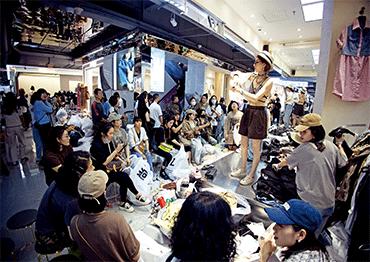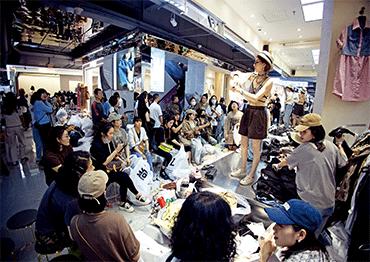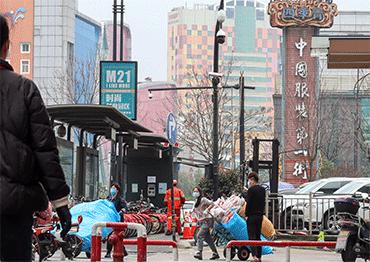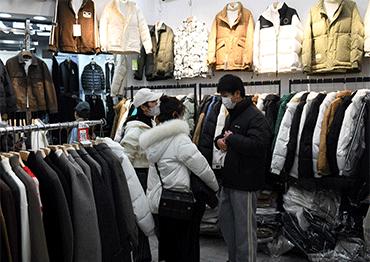According to Wang Xuefeng, deputy director of circulation and consumption research at the National Academy of Economic Strategy, CASS, even by 2012, wholesale markets were no longer expanding.
“Commodity trading markets are now in a late period of saturation and elimination and entering a new phase of innovation and high-quality development,” he said. “China’s commodity trading is characterized by small producers and big markets which work to effectively reduce circulation costs and raise efficiency. So as long as the fundamental conditions for the markets to exist don’t change radically, they won’t disappear and will continue to develop by optimization and upgrading,” he added.
Yifa Group’s Guo Furong decided that training innovative designers and upping quality would give them an edge. Yifa Clothes Market is the first in China to keep records of original designs, and has an area dedicated to selling designer clothes.
“We now focus on original designs and the quality of the clothes. I think this will bring us long-term benefits and make our development sustainable,” Guo said.
As a wholesale market, Yifa is concentrating on better serving the sellers and managing the market, Guo said. Sijiqing Market now allows stores to bring in models to show their new clothes on site.
Data from Zhejiang provincial government shows that despite a drop in the number of offline commodity markets in Zhejiang since 2013, their transaction volumes did not fall in the same period, but actually increased. In the first three quarters of 2023, commodity markets in Zhejiang reached a total transaction volume of 1.65 trillion yuan (US$230.5b), a growth of 8.49 percent year-on-year.
But consumption researcher Wang Xuefeng believes markets should embrace the internet rather than ban it.
“Banning is not the best solution. Markets should cater to and serve different sellers,” he said.
Professor Ying Zhongdi agrees. “Livestream sales are a new growth point. If the offline economy can leverage it properly, it will help them fly high once again,” he said.
Although they refuse to do livestreaming, both Dabai and Jiang Zucai use their own online platforms to promote products, targeting existing customers. This way, they can better serve their customers while not stealing business from them.
Despite the ban on livestreaming sales, Jiabao Group is helping stores in the market to use online tools like WeChat and short-video platforms to promote products and improve their service.
“We hope that offline and online commerce will have more benign integration. We can’t just replace one leg with another leg. When can we walk with both legs?” general manager Wang Jiahui said.
The offline economy has long been trying hard to narrow the gap with ecommerce while maintaining their advantages. There has been some effect. Media reported that during this year’s annual November 11 shopping promotion, primarily an online event first pushed by Alibaba’s Tmall and Taobao, brick-and-mortar stores also offered coupons and discounts. This appeals to consumers who are reluctant to buy online.
“I’d rather buy clothes for my daughter in real stores where I can feel the materials myself,” Gao Rui, mother to a 3-year-old daughter in Beijing, told NewsChina. “I used to buy some from livestreaming channels on Douyin, only to find that the materials of some clothes seemed different from what I saw, and some even smelled really bad,” she continued.
“I do believe in the adage ‘you get what you pay for,’” she added.
“Livestream sales often offer a low price, but it does come at the cost of your time, because they go on and on about a product before they give their final offer. It’s quite noisy and timewasting. And worse, such an environment often generates impulse buying,” Chen Lina, a 42-year-old resident of Hangzhou, told NewsChina.
“The only advantage of online shopping for me is the convenient return and refund system,” she said.
On October 30, Hangzhou government issued a draft bill on the management of livestream sales, which will include rules on livestreamers’ ages, price competition and marketing. It will forbid livestream sellers from demanding low price agreements with manufacturers or exclusive agreements relating to monopoly, price fraud or dumping.
The draft is expected to increase protection for offline sellers as well and promote what Wang Jiahui said is the “benign integration” of offline and online sales.
Online and offline sales should not be “decoupled,” Cheng Weixiong said.
“Those who generate online sales should share their skills with offline sellers, and those focusing on offline sales should look to develop their online selling, so as to integrate all pipelines,” he said. “This will benefit both offline and online sellers – it’s a win-win,” he added.

 Old Version
Old Version


